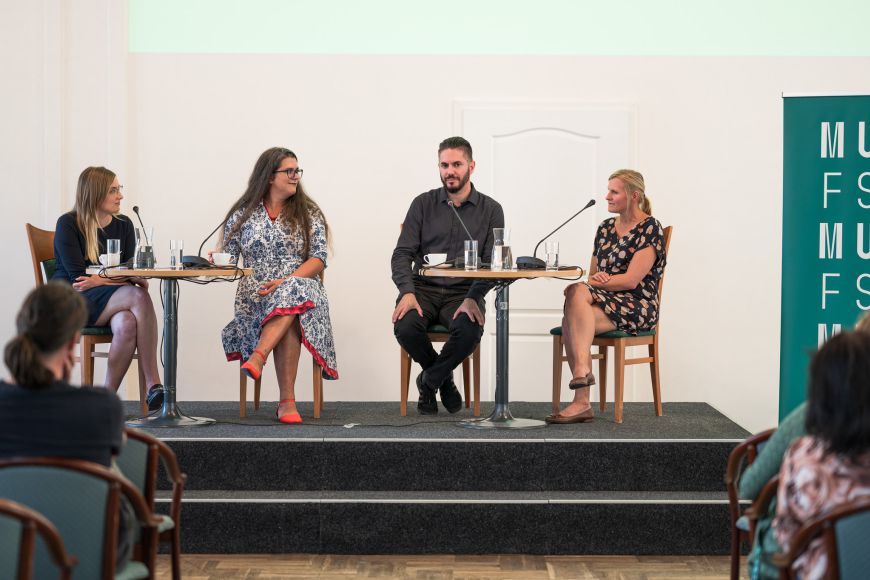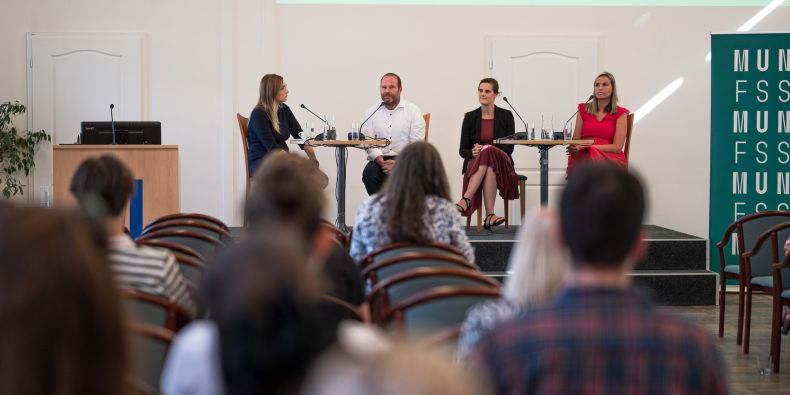“For a faculty that wants to be a leader in the social sciences, we cannot expect a quarter-century celebration without an academic conference where faculty members present the most interesting parts of their research. This time, however, we did not go for the most famous names from each department, but invited unknown scholars who are doing interesting research that the media is not yet interested in,” said Stanislav Balík, Dean of the Faculty of Social Studies, in the opening speech of the conference Czech Society through the Eyes of the Faculty of Social Studies.
Subsequently, Slovak diplomat, politician, and actress Magda Vášáryová tried to characterize Czech society: “A good colleague of mine would say of our society that it is so poor that we can't even park in the city. I would say that not only Czech society, but the whole world is going through rapid changes. In recent years it is the internet, hacking, fake news, or the rise of radical political parties in democratic countries. We have experienced communism, so we must share our thoughts and research on this topic with the Western world. The world expects us to contribute to the understanding of what is happening here.”

The conference continued with three thematic blocks where leading scholars from the Faculty of Social Studies discussed pressing issues of Czech society. In the first block, entitled “The Youngest Generation in a Complex Age,” Jitka Navrátilová, assistant professor at the Department of Social Policy and Social Work, presented her research on parenting behind bars. “My research is innovative in that it is the first of its kind in the Czech Republic. Neighbouring countries are ahead of us. Their researchers have been doing research with children whose parents are in prison for several years. However, for Czech society, these children are either invisible or we perceive them negatively, we treat them differently and think that they have no future, that they will end up like their parents,” said Jitka Navrátilová about her research.
Vojtěch Pelikán, an environmental anthropologist from the Department of Environmental Studies, spoke about environmentally friendly lifestyles. The research of Michaela Lebedíková, a PhD student at the Department of Media Studies and Journalism, on digital intimacy was also very popular with the audience. “I was very interested in this research because I had not heard of anyone dealing with the sexuality of adolescents and the content that influences it. I find it great that someone has finally opened up this topic,” Karolína Landová, a student of social anthropology, said positively about the first discussion.

“There is a lot of research looking at how public media should be regulated and controlled, but there is little research looking at trust in public media. When there is such research, it is only about how many people distrust the media. But I haven't found any research on why people don't trust the media and what the media should do differently and better,” explained Klára Smejkal, a PhD student at the Department of Media Studies and Journalism, who opened the second session's debate, which was devoted to the “distrustful society.” In addition to Klára Smejkal, Vít Hloušek from the Department of International Relations and European Studies and Petra Mlejnková, a specialist in security policy and radicalism, shared their thoughts.
“I was very struck by the idea of Professor Hloušek, who identified us as the culprits of the mistrust. In my opinion, it is important to realize that it is not only the political elites who are to blame for mistrust in society but also ourselves,” Pavlína Kutnarová, a student of European studies, said, sharing her feelings about the discussion.
The last session focused on the underestimated old age. Miloš Gregor from the Department of Political Science presented the elderly as the most lucrative group for political parties. “Like my colleague, I think that we should not put the elderly on the back burner. We should not discriminate against them, because one day we will be old too. Our society may not want to grow old, but despite our minds, our bodies age every day, and one day we will reach a point where society will define us as seniors,” said sociologist Lucie Vidovićová.

The last speaker was psychologist Anna Ševčíková, who presented her research on sexuality in the elderly, an often taboo and overlooked issue in our society.
The interest of students in academic conferences at the Faculty of Social Studies is always great, and yesterday was no different. Some came to fill time between lectures, others to support their lecturers. “I was recommended to attend the conference by the lecturer of one of my courses, who spoke during the second session. However, I came early and listened to the preceding speakers [. . .] I was most interested in the research on adolescent sexuality. I had no idea that such topics could be discussed at the Department of Media Studies and Journalism,” said Bára Trnková, adding that she would read more about the research at home.
